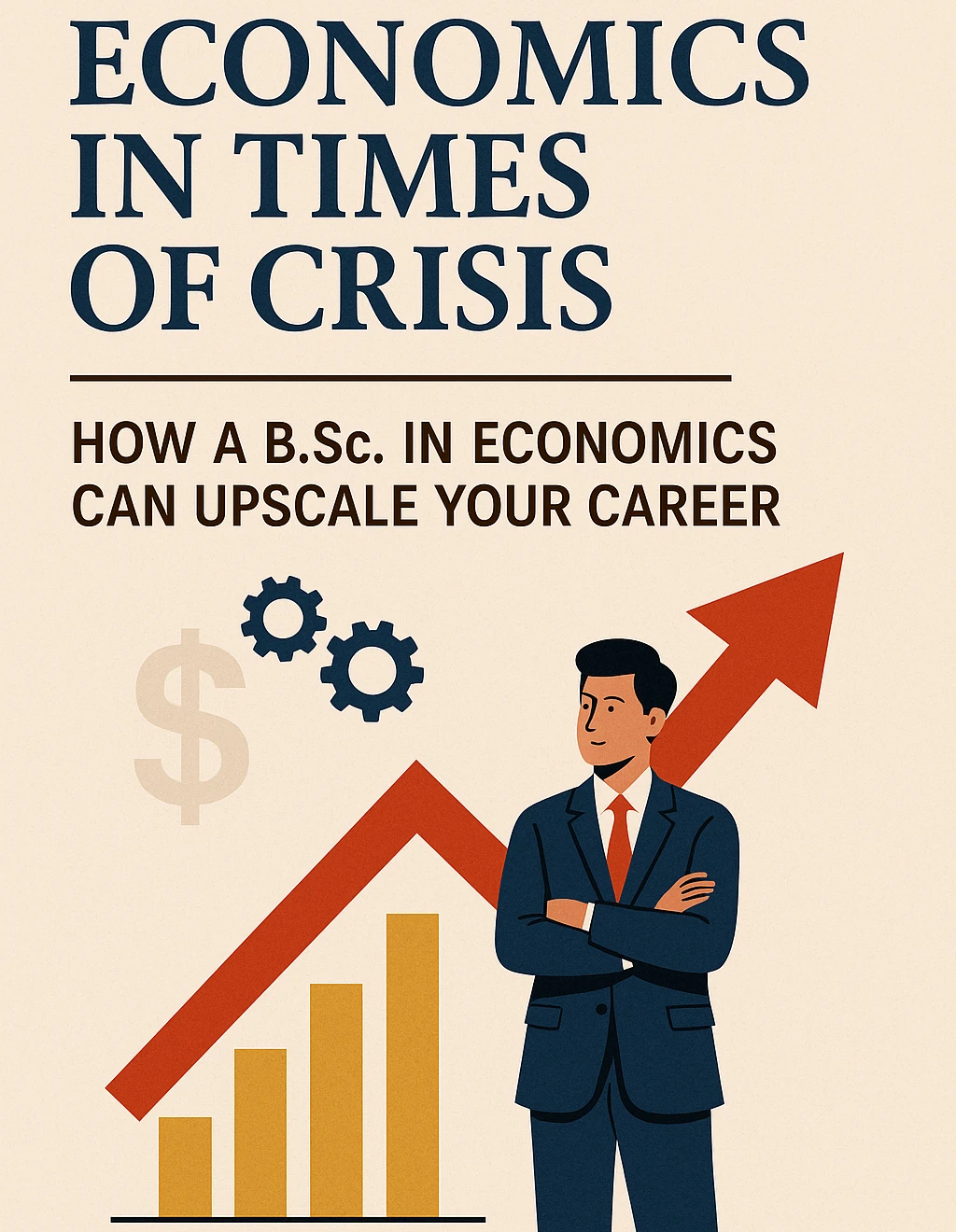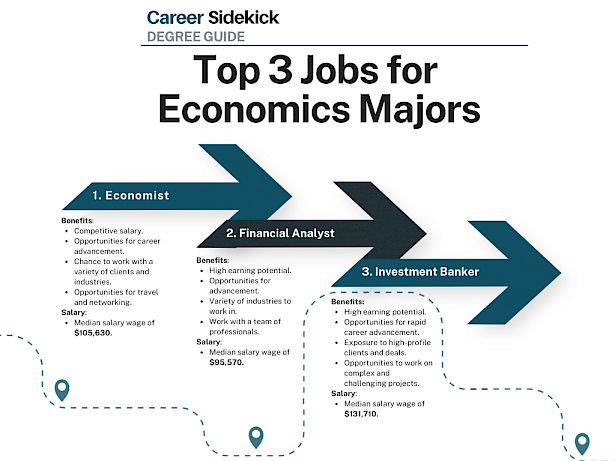Economics in Times of Crisis: How a B.Sc. in Economics Can Upscale Your Career

Blog / April 16, 2025
Economics coursesB.Sc. in EconomicsB.Sc. (Research) in EconomicsIn the current intricate and intertwined world, economic challenges have become more frequent and far-reaching. Geopolitical tensions, economic crises, pandemics, and climate change impacts are reshaping the economic landscape in profound ways. As we grapple with these challenging times, the necessity for professionals who can comprehend, evaluate, and steer economic challenges has been greater than ever.
This is where a Bachelor of Science in Economics slips in as a powerful educational pathway, entrusting students with the skills and in-depth knowledge to tackle economic uncertainty and succeed in an ever-evolving professional landscape.

Source: https://careersidekick.com/
Table of Contents
- Comprehending Today’s Economic Challenges
- The B.Sc. in Economics Advantages
- The B.Sc. Economics Subjects
- Career Opportunities and Advancement
- Salary Expectations After a B.Sc. Economics
- Economics Education as Career Insurance
- Crack the Code of Global Economies with a B.Sc. (Research) in Economics at Shiv Nadar University (Institution of Eminence)
- The Key Highlights: B.Sc. (Research) in Economics
- The B.Sc. (Research) in Economics Eligibility
- To Wrap It Up
- Frequently Asked Questions
Comprehending Today's Economic Challenges
The 2025 economic landscape is characterized by multiple overlapping crises; for example, inflation concerns persist in several economies, with central banks meticulously balancing price stability against growth. Supply chain distributions, initially triggered by the dreadful COVID-19 pandemic and exacerbated by geopolitical tensions, continue to take a toll on global trade patterns. Climate change is increasingly being manifested as an economic challenge, with intense weather events disrupting agriculture, infrastructure, and energy systems. Simultaneously, technological disruption is revolutionizing labor markets, with industries and regions seeing both winners and losers.
These challenges are not isolated incidents but rather interlinked phenomena requiring sophisticated analysis and nuanced comprehension. And, these crises demand experts who can think systematically, analyze intricate data patterns, as well as develop evidence-based solutions, to be precise- the skills cultivated during a B.Sc. degree in Economics. But what is B.Sc. in Economics?
The B.Sc. Economics Advantage
A 3-year B.Sc. in Economics degree provides a robust foundation in both theoretical frameworks and practical applications. It amalgamates mathematical precision with social science insights, entrusting graduates with a distinctive analytical toolkit. Graduates of this program are well-structured and prepared for careers in finance, research, government, and academia.
The B.Sc. Economics Subjects
Semester 1
- Academic Writing
- Logic & Scientific Reasoning
- Principles of Microeconomics
- Calculus I
Semester 2
- Modernity: An Interdisciplinary Exploration
- Principles of Macroeconomics
- Intermediate Microeconomics
- Introduction to Probability
Semester 3
- Game Theory
- Intermediate Macroeconomics
- Introduction to Statistics
Semester 4
- International Economics
- Introductory Econometrics
- Introduction to Computer
Semester 5
- Development Economics
- Departmental Electives
Semester 6
- Advanced Microeconomics
- Departmental Electives
Semesters 7 & 8
- Research Projects
- Departmental Electives
Core courses in Microeconomics as well as Macroeconomics help learners comprehend decision-making at individual and economy-wide levels. Econometrics and statistical analysis subjects build quantitative skills necessary for making sense of complex data. Specialized modules in international economics, public policy, development economics, and financial economics enable students to develop expertise in various areas aligned with their career interests.
In addition to the above paragraph, B.Sc. Economic subjects majorly focus on practical applications via several methods, such as case studies, simulations, and real-world projects. Also, many programs now include data science and programming skills, which help prepare students for the growing technical nature of economic analysis in the digital era.
Career Opportunities and Advancement
The scope of a B.Sc. in Economics is substantial and dynamic. Graduates find opportunities across numerous sectors. Have a look beneath:
-
The Public Sector
In the public sector, Economists help shape policy responses to economic challenges at local, national, and international levels. Central banks, government ministries, and international organizations like the IMF and World Bank rely on economic prowess to steer crises and develop resilient systems.
-
The Private Sector
In the private sector, banks, investment firms, as well as consultancies value economists for their analytical skills and ability to forecast market trends. Corporations across industries employ economists to analyze market conditions, optimize pricing strategies, and examine investment opportunities.
-
The Non-profit Sector
The non-profit sector also offers satisfying career opportunities for economics graduates with diverse roles in think tanks, research institutions, and NGOs, emphasizing addressing economic inequalities and promoting sustainable development.
Beyond these conventional paths, a B.Sc. in Economics acts as a great foundation for entrepreneurship, providing the analytical skills to identify market opportunities and examine business models.
Salary Expectations after a B.Sc. Economics
The salary package for B.Sc. Economics graduates can vary depending on the industry, job roles as well as experience level. Mentioned underneath is an approximate salary table. Read on to know.
|
Investment Banker |
Provides financial advice to corporates and helps them with acquisitions and mergers. |
INR 16.7 LPA |
|
Economist |
Analyzes and prepares reports for improving the financial situation of a business |
INR 16.4 LPA |
|
Actuary |
Assess the present financial situation and plans for uncertain financial conditions. |
INR 7.5 LPA |
|
Financial Analyst |
Creates financial models that could be beneficial for investors and assesses stocks and investments. |
INR 5.9 LPA |
|
Stockbroker |
Enable the sale and purchase of stocks |
INR 2.8 LPA |
Economics Education as Career Insurance
Perhaps most importantly, economics courses act as a form of career insurance at times of economic uncertainty. The analytical and quantitative skills built and honed via B.Sc. in Economics remain invaluable across altering economic conditions. For example, when several sectors contract during downturns, economics graduates often find that they can adapt their skill sets to brimming sectors as well as support organizations to navigate challenging times.
Not to be forgotten, the ability to comprehend complex frameworks, decipher data and make evidence-based decisions remains significant, irrespective of economic conditions. As automation and AI revolutionize the job market, these higher-order thinking skills become increasingly important career differentiators.
Crack the Code of Global Economies with a B.Sc. (Research) in Economics at Shiv Nadar University (Institution of Eminence)
The School of Humanities and Social Sciences at Shiv Nadar University offers a unique B.Sc. (Research) in Economics program in India. Designed to be comparable to internationally recognized programs, it amalgamates rigorous academic training with flexibility in course selection. The B.Sc. (Research) in Economics stands out by offering a structured yet customizable curriculum that aligns with global standards, providing students with both depth in their studies and the freedom to explore their interests. The university also offers electives at the undergraduate level in the following areas:
- Industrial Organization
- Public Economics
- International Trade
- Environmental Economics
- Growth and Fluctuations
- Behavioral Economics
- Economics of Discrimination
- Labor Market Macroeconomics
- Multinational Corporations
- Financial Econometrics
- International Finance
- Money & Banking
- Development Economics
- Labor Economics
- Poverty and Inequality
- Advanced Econometrics and
- Basics of Survey Design
The Key Highlights: B.Sc. (Research) in Economics
- Undergraduate Program: An all-inclusive B.Sc. (Research) in Economics program covers core subjects such as microeconomics, macroeconomics, and econometrics.
- Research Opportunities: Learners get opportunities to engage in research-centric real-world projects that address modern economic issues.
- Interdisciplinary Approach: Data analytics are incorporated with public policy and management aspects into the curriculum to expand students’ horizons.
- Skill Development: Hands-on learning and practical training in statistical software and data analysis tools make sure that students are ready for the job market or advanced studies.
- Worldwide Exposure: Collaboration with other international institutions proffers a deeper understanding of the principles that shape global economic systems.
The B.Sc. (Research) in Economics Eligibility
Candidates taking up the B. Sc. (Research) in Economics course are required to fulfil the following eligibility criteria:
- Applicants must have either completed 12th at the time of applying or must be appearing in 12th or equivalent in the same year in which they are seeking admission
- If the class 12th result is available at the time of application, it must be submitted with the application form and
- Applicants must have studied Mathematics in Classes 11th and 12th
To Wrap It Up
In a world characterized by economic uncertainty and rapid change, a B.Sc. (Research) in Economics provides more than just academic knowledge – it gives a versatile toolkit for career success. By building strong analytical capabilities, quantitative skills, and systemic comprehension, economics graduates position themselves to not just respond to crises but to identify opportunities within them. On the off chance that you are seeking to have a career path that combines intellectual challenge with real-world impact and professional resilience, a B.Sc. (Research) in Economics is for you. Remember, there are just a few educational choices that offer the same potential as Economics. Apply now at Shiv Nadar University.
Frequently Asked Questions
- What are the current economic challenges that professionals need to address?
Geopolitical tensions, economic crises, pandemics, and climate change impacts are reshaping the economic landscape. These challenges require experts who can analyze complex data and develop effective solutions.
- How does a B.Sc. in Economics help in addressing economic uncertainties?
The B.Sc. in Economics equips students with both theoretical knowledge and practical skills, enabling them to understand and navigate economic disruptions and uncertainties effectively.
- What are the perks of pursuing a B.Sc. in Economics?
The B.Sc. in Economics provides a strong foundation in economic theory and practical applications, combining mathematics with social sciences. Graduates are prepared for diverse career paths in finance, research, government, and academia.
- What subjects are covered in a B.Sc. in Economics program?
Key subjects include microeconomics, macroeconomics, econometrics, game theory, international economics, development economics, and specialized electives like behavioral economics, environmental economics, and financial econometrics.
- What career opportunities are available after completing a B.Sc. in Economics?
Graduates can work in the public sector (policy-making), private sector (finance and consulting), or non-profit sector (research and NGOs) and can also pursue entrepreneurship or further studies in economics.
- What are the salary expectations for a B.Sc. Economics graduates?
Salaries vary by role and industry. For example, investment bankers earn around INR 16.7 LPA, economists earn about INR 16.4 LPA, financial analysts earn INR 5.9 LPA, and stockbrokers earn INR 2.8 LPA.
- How does economics education serve as career insurance?
Economics graduates possess analytical and quantitative skills that are valuable across changing economic conditions, enabling them to adapt to various sectors even during economic downturns.
- What makes the B.Sc. (Research) in Economics program at Shiv Nadar University unique?
This program combines rigorous academic training with flexibility in course selection. It offers research opportunities and an interdisciplinary approach, with exposure to data analytics, public policy, and international economics.
- What are the key highlights of the B.Sc. (Research) in Economics program at Shiv Nadar University?
The program offers core courses, hands-on learning, interdisciplinary training, and opportunities for real-world research projects. It also provides worldwide exposure through collaborations with international institutions.
- What is the eligibility criteria for the B.Sc. (Research) in Economics at Shiv Nadar University?
Applicants must have completed or be in the process of completing their 12th grade with mathematics as a subject. They must submit their class 12th results with the application form, if available at the time of application.